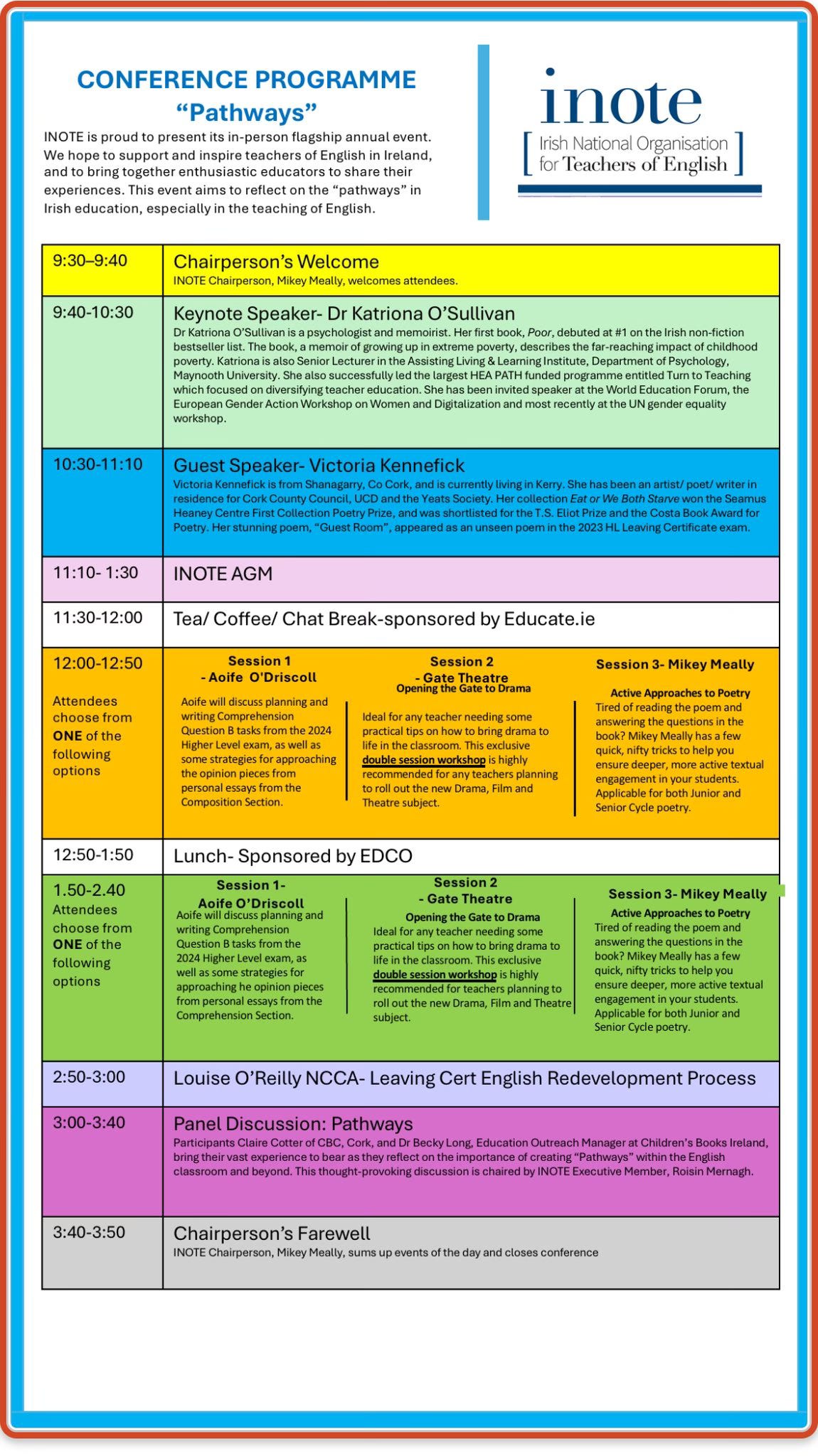175: The Septaquintaquinquecentennial.
William Butterfield by Nicholas Olsberg, Katherine Rundell, 'King Lear' podcasts, Claire Keegan, John Finnemore, Books for English teachers, Jade Pearce & Isaac Moore, and more.
Number 175! I’m now off on my half-term holiday.
Current reading: 100 pages into Sally Rooney’s Intermezzo. After that, Tim Parks’s Mr Geography. Those will kick-start the break well.
William Butterfield
was the architect of the building I have spent more time in than any other, apart from my family homes. Nicholas Olsberg’s new biography, The Masterbuilder: William Butterfield and his times, is also the first. It is a superb achievement, and physically beautiful to boot.
I wrote about it, including the link with one of my favourite poets, Gerard Manley Hopkins.
A lot of English teachers in Ireland
have chosen to study Claire Keegan’s novel Small Things Like These for the Leaving Certificate. I gave a webinar on the book in early September, and 950 people turned up, so in conjunction with Tralee Education Support Centre I’m repeating it just after half-term for those who missed out.
Details in the graphic above.
Katherine Rundell
wrote my book of 2022, Super-Infinite: the transformations of John Donne, very different from her terrific books for children (though I think she would make connections between them). My daughter and I read Impossible Creatures with pleasure a while ago.
Rundell’s recent essay series for BBC Radio on children’s fiction The Lion, the Witch and the Wonder presents five 15-minute talks ranging widely across the genre. It’s passionate and informed advocacy at its best. All the talks here: I thought the third one particularly good.
The English teachers’ conference
last week in Portlaoise was, as ever, invigorating. The keynote speaker, Katriona O’Sullivan, who wrote Poor, which I recommended a month ago, was excellent, as were the other speakers and presenters. Concerns about Leaving Certificate reform are widespread: next year there is likely to be a lot more.
The annual magazine of INOTE can be read online; my Personal Anthology piece about short stories for the classroom is in there.
Encouraging English teachers:
I taught this scene the other day. John Finnemore skewers our eagerness to encourage contributions.
Books for English Teaching:
More next time.
Andrew Atherton’s Experiencing English Literature (2023) offers many ideas, well-grounded in fundamental principles, of how poetry, fiction and drama can be approached in the classroom.
Carol Atherton’s Reading Lessons (2024) is the best account of what it means to be an English teacher. She discusses books like Great Expectations, I Know Why the Caged Bird Sings and An Inspector Calls, and how they have affected both her and her pupils over the years.
Kevin Cahill and Niamh Dennehy (editors): Perspectives on the Teaching of English in Post-Primary Education is the best introduction to the profession in Ireland right now, mixing third- and second-level perspectives, with valuable contributions from current practitioners like Clare Madden, Conor Murphy, Selena Wilkes and Caragh Bell.
Chris Curtis: How to Teach English: novels, non-fiction and their artful imagination (2019) is packed full of good sense and ideas, and how these can work in the classroom.
David Didau: Making Meaning in English: exploring the role of knowledge in the English curriculum (2021) is a rare example of a book analysing what the subject is for, rather than how to teach it.
Bennie Kara: Diversity for Schools (2020) isn’t (just) for English teachers, but for everyone who works in schools, but it provides lots of helpful ways forward for English teachers eager to attend to diversity in texts, in language, and in the wider school culture.
Tom Needham: Explicit English Teaching (2023) provides a clear introduction to how cognitive science can underpin good practice in our profession.
Andy Tharby: Making Every English Lesson Count: six principles to support great reading and writing (2017) has lots of practical guidance.
Jennifer Webb: How to Teach English Literature: overcoming cultural poverty (2019) is directed partly at GCSE study in England, but will still be found useful by teachers in Ireland and beyond.
‘Desirable difficulties’
should by now be a familiar term in teaching. It refers to the fact that our pupils benefit from a well-calibrated level of challenge, some ‘difficulty’ that helps to strengthen their learning (as opposed to their performance). Think of sport, and how training which is easy is of little use to athletes.
Jade Pearce and Isaac Moore have written a helpful short guide, Bjork & Bjork’s Desirable Difficulties In Action in the increasingly valuable series edited by Tom Sherrington: more.
Teaching and Learning Things:
I’ve written about GenAI and the Leaving Certificate for the Irish Times: should be in on Tuesday.
Links and slides from my webinar on October 16th on King Lear via Tralee Education Support Centre - thanks to the 400 teachers who attended for their kind remarks on the feedback form. Above, a pic of some of the books I used (the Macbeth one is not a mistake).
Also, in the King Lear scene by scene podcast - now we have Act 1 scene 1, scene 2 and scenes 3 and 4. Also on Spotify, etc.
Conor Murphy on Why I Love Teaching (needs to be said).
In the Irish Times Breda O’Brien called me a ‘veteran’ English teacher, which at least is better than ‘old’. But she’s right about other things in the Irish system right now (subscribers).
Christine Counsell is one of the wisest commentators on education. Her recent article in Schoolsweek on the national curriculum in England makes several points which the Irish system would do well to keep in mind:
Seductive hierarchies of generic, skill-based descriptors (‘describe’, ‘compare’, ‘analyse’, ‘evaluate’) must go – once and for all. Curriculum and assessment rubrics can’t stop teachers doing this, but they could avoid encouraging it.
The past 35 years have taught us that far from fostering valuable skills, such ‘command verbs’ promote formulaic procedure … Over 35 years, we’ve had ‘Key elements’, ‘KSUs’ (knowledge, skills, understanding), ‘Concepts and processes’. Don’t. Just don’t.
A new blogpost on Lady Macbeth by Heather Hale, not dissimilar to my own on the ‘real Lady Macbeth’:
Rather than perceive this beautifully complex character as a flat-pack rendition of the epitome of evil, I believe it is high time that she is discovered in her own right for all the flaws and awes of her perfectly fallible self.
The Penguin Lit in Colour guide (4th edition): 100 texts by writers of colour. A good mix: the famous names (Toni Morrison, Arundhati Roy) rubbing shoulders with the lesser-known.
A handy summarising piece on graphic organisers by Nathan Burns.
On the Waterfront
is being shown at The Complex in Dublin 7 on the Irish stage for the first time on the next month, including school-focussed matinées. The play is based on the film, a comparative Leaving Cert English text, so The Complex will provide teachers who make group bookings with educational packs to support classroom discussion & learning. Contact annie@thecomplex.ie for special school rates & group bookings.
Et Cetera
I loved Mr Loverman by Bernardine Evaristo, so looking forward to this BBC TV adaptation. Here’s a clip.
Darcy Moore on the positive ending of Nineteen Eighty-Four.
The novel, in fact, closes on a note of hope, albeit subtle and retrospective.
The cultural phenomenon which is Ireland’s RIP.ie.
I love pens. Here’s some pen porn [gift link]. And now you can rent pens!











